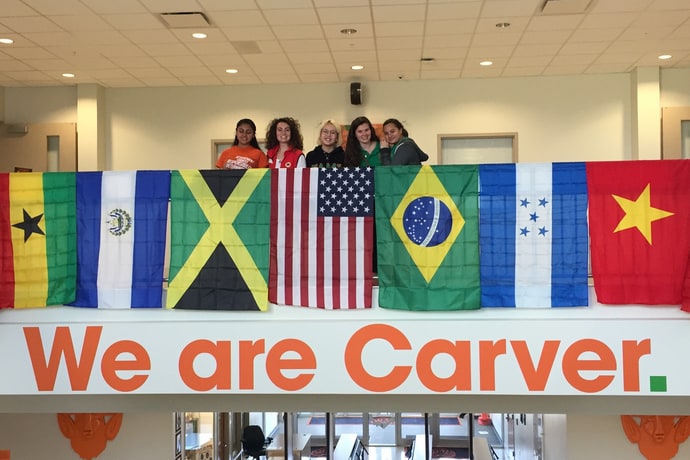Supporting English Language Learners in the Midst of COVID-19

The coronavirus pandemic impacted high schoolers in many ways, but one group that faced significant additional challenges was English language learners and undocumented students. Even with extraordinary levels of support from schools and communities, these students face enormous hurdles. Many are in the U.S. unaccompanied, meaning they must work full time to support themselves, pay rent, and pay for legal services. As a result, only a third of these students in New Orleans earn a diploma during a regular school year—and the pandemic has only increased their barriers to graduation.
Emma Merrill (Colorado ’13) has used her experiences working with Latinx communities and her knowledge of the challenges that many Latinx students face to lead new innovations at her school in the face of the COVID-19 pandemic.
Supporting Students in the Ninth Ward
Originally from Virginia, Emma was inspired to join Teach For America after spending a summer teaching English in Honduras. She taught at a school for Mexican immigrants in Denver, Colorado, before moving to New Orleans and becoming the ESL program lead at George Washington Carver High School in the Ninth Ward. In addition to its highly touted gifted-and-talented program, Carver serves students with mental and physical disabilities, offers trauma-informed mental health support and helps with legal services. It also provides a free clinic and a food pantry, all of which are crucial for many Carver students and families.
Emma first became concerned about the pandemic in early February, when students began telling her that if schools closed due to the coronavirus, they would have to drop out and look for jobs to help support their families. Many of her students help pay rent or legal fees, and some send money back to their families in their native countries.
“I was worried that students would drop out of school and our seniors wouldn't be able to graduate,” she says. “But most importantly, I was worried about students not getting what they need while in quarantine: meals, medical services, and counseling services. I was especially worried about my students who receive counseling and have experienced intense trauma in their home-countries. I was worried that they would feel alone and abandoned. Since we've been in quarantine, one of my students has made a suicide attempt and I'm worried about the future.”
“Emma's work is an example of a do whatever it takes mentality in order to support kids.”
Reaching Out During the COVID-19 Lockdown
In the first week of quarantine, Emma and members of her team at Carver checked in with each student’s family, determining which ones needed supplemental technology and materials. Through its network with other schools, Emma’s team created packets for humanities and math courses that were translated, linked on Carver’s website and, in many cases, hand-delivered to those without transportation.
“Our staff is really committed to evolving and growing in order to meet the needs of our kids,” says Jerel Bryant (Greater New Orleans '07), the principal at Carver and the 2021 Louisiana High School Principal of the Year. “We quickly realized last spring that we had access to many of the communication tools that we were using already or knew how to use. We identified communication with our families as our lever. This lever has ironically brought us that much closer to our community that we get to serve in a time of distance by using phone calls, Google hangouts, and FaceTime.”
In the second week, Emma saw how families, especially those who were undocumented, struggled with access to basic services, including drive-up testing, mental health supports, and food.
“Food pantries are running out of food in New Orleans at a time when my students' families are out of work,” she shares. “The majority of my families are undocumented and will not be receiving stimulus checks. Three of my students have had coronavirus but are afraid to go to a hospital because they don't have health insurance.”
“My students have fought all of the odds to come to this country and to receive a high school diploma. They deserve the very best that education can provide.”
Doing whatever it takes for students and families
In response, she organized calls with case managers and social workers to figure out answers and develop messaging in Spanish. She provided instructions on accessing telehealth services through Carver’s free clinic and information on local food pantries. In a moment of particular innovation, she partnered with a local nonprofit to produce a video that explains in Spanish how to complete the U.S. census.
“I’ve set up telehealth appointments for families who have had coronavirus. I’ve translated calls with families and Cox Communications to set up internet hot spots. I’ve sent students reminders about their virtual calls with their immigration lawyers. I’ve delivered Chromebooks and food to families in need. I’ve checked in with my seniors every day to ensure they’re completing their college applications and helped them practice their interviews in English.”
Jerel recognized the importance of Emma’s work during the pandemic and the impact it had on her students. As part of the team of teachers at Carver who most directly worked with the scholars who are English language learners, he encouraged her leadership.
“Emma's work is an example of a do whatever it takes mentality in order to support kids,” he says. “Emma and her teammates called anyone and everyone, and responsibly visited homes, places of employment, and anywhere we could find our kids.”
Emma hopes that, because of the pandemic, there will be more flexibility in how students can learn. Over the last several months, she’s had many students call and ask about re-enrolling in school now that they know they can study from home.
“My students have fought all of the odds to come to this country and to receive a high school diploma,” Emma said. “They deserve the very best that education can provide."


